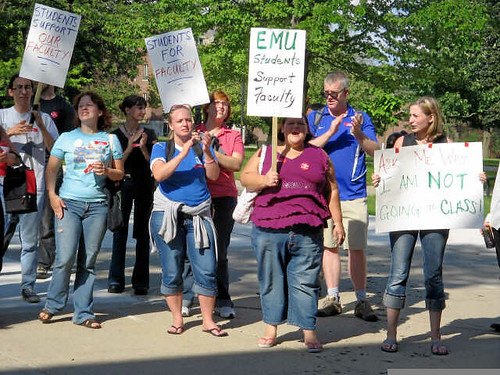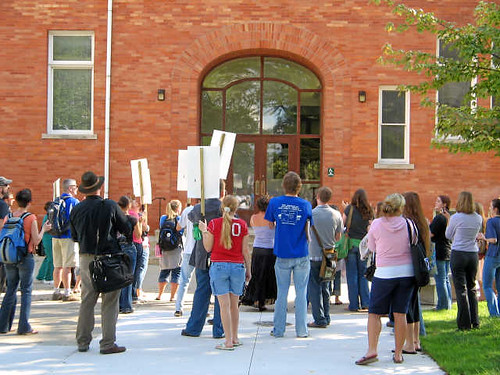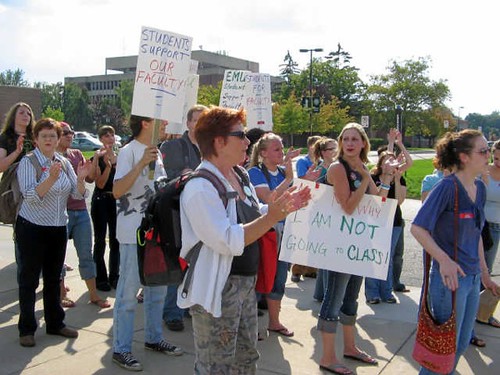It was another day on the picket line– a hot one, too. I have to remember to get on some sunscreen the next time I go out there, which, I predict, will be tomorrow morning. There seems no sort of settlement or even a renewal of talks anytime soon, even though I can think of NO ONE who does not both of these things, not faculty, students, adjuncts, lecturers, staff, administrators, NO ONE.
Well, not no one, maybe. I’m not sure the top leadership of the administration or the top leadership of the union are ready for this to end.
Anyway, I started out the day at Pray-Harrold, the building where I teach, even though I am not scheduled to be on campus at all today. Mostly, I passed out flyers and stickers to students. One thing I discovered the other day: it’s really hard to hold a picket sign and to hand out flyers to students. Maybe, if we’re out long enough, I’ll get the dexterity to do both.
Students still seem to be very much behind us. I talked with lots of students who had words of encouragement, lots of students who had questions, lots who were interested in learning more about the issues. And sure, there were plenty of students who were either apathetic or had just probably had enough.
Curiously, there were not administrators out there talking to students. At least not as far as I can tell.
Lots and lots of students were wearing their “I Support the Faculty” stickers and the buttons that we have been passing out that say the same thing have become a coveted item. By the way, here’s a picture of my last of these buttons:
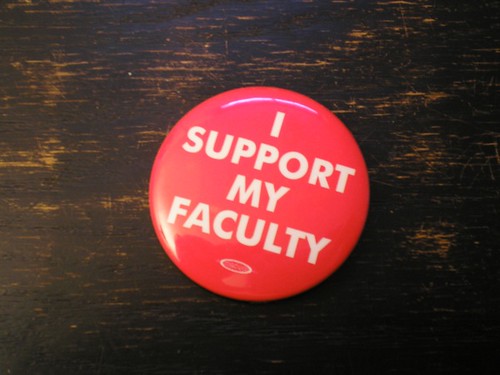
I’ll give it out tomorrow, I hope.
There were more student protests, small but large and enthusiastic. While I was hanging around/picketing outside of Pray-Harrold, a group of roving student protesters came by:
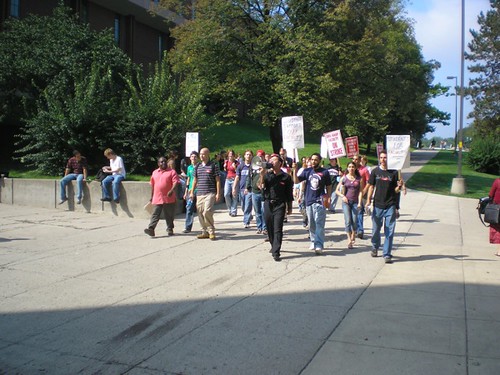
Slight tangent #1: I don’t want to be too critical of the way the EMU-AAUP is running things, and I realize that I have the benefit of not actually being at the office making various decisions. But in a situation like this, it’s time for the union to get some outside help with things like Public Relations and event organization. I’m not saying that we need to replace Bunsis as a spokesperson– I think he’s doing fine– and by “outside,” all I mean are members of the faculty who are not on the Executive Committee of the EMU-AAUP. We have a couple of PR and print journalism folks in our department who probably would have been happy to help. As I understand it, the PR unit of the EMU-AAUP is pretty much Howard. /tangent
Oh, one more fun-fact about picketing by Pray-Harrold: I tried to hand a leaflet to one of the few faculty who has crossed the lines, none other than former provost (and by “former,” I mean he was asked to not do that job anymore) Paul Schollaert. He didn’t take one.
With a couple colleagues, I marched over to the construction area for the new union and then to one of the construction enterances. The union has pickets here because there are a variety of unions that won’t cross lines, and, apparently, we’ve been reasonably effective in disrupting some deliveries and such at EMU. As I understand it, one of these colleagues has a couple stories to share about run-ins with the campus police and turing around trucks with her sign.
Rumor #1 (though I should point out that all of these rumors come from fairly reliable sources; I can’t just confirm the truth of these things independently): Speaking of disrupting things around here, I heard the other day that a picket line stopped a Coca-Cola delivery truck. The driver stopped the truck in the street; I guess he was a Teamster or something. He came over and talked to the strikers politely enough while an unmarked white van came up. A guy got out of the van and started unloading soda from the big delivery truck and into the smaller van. When the strikers asked what was going on, the driver said “that’s a supervisor.”
Rumor #1b: The same thing has happened with UPS. While the delivery guys in the UPS union won’t cross picket lines, their supervisors will.
Either way, it’s not a perfect “ring of steel” around the university. But it’s pretty good.
After some picketing, I headed over to Bombadill’s to hold some quasi-office hours for students, which for me this term means graduate assistants who are teaching first year composition.
This leads me to tangent #2: One of the many things this strike has made me think about a lot lately is what exactly constitutes “work” for a faculty member. Both the union and the administration have concentrated on the most visible work faculty do, which is teach. But I would say that less than a third of my work involves classroom teaching. So much more of my job is meetings, scholarship, advising, answering emails from students, duties as assigned, etc., etc. And this doesn’t even cover the release time I get to do quasi-administrative work. I spent about 3 or 4 hours on Monday going through a backlog of email, most of it from students seeking advising or making inquiries about our programs. Is this “work?” Because of my Interim WPA duties, I feel a certain obligation to at least be available to the graduate students teaching for the first time. It would seem awfully inhumane to not be there to these folks during a really really stressful time for them. And, by the way, as far as I can tell, everyone had a fine first day teaching experience.
Clearly, I am not the only one who made some personal decisions about what work they would and wouldn’t do while on strike. When I walked into Bombadill’s, it was like EMU in exile. Someone was conducting some version of a class in the front part of the place– forty or so students sitting around while the prof lectured. In the back, some folks were working on a grant; as they said, the such-and-such (I don’t know if it was the NSF or NEH or whatever) has deadlines that have nothing to do with the strike. /tangent
Rumor #2: Speaking of the teaching part of things: it seems pretty clear to me that the great majority of courses that are supposed to be taught by faculty aren’t being taught by anyone at all. I know of at least one department head who has told lecturers and part-timers that there was no way he/she would ask non-tenure-track faculty to teach the faculty’s classes. This is not the only story I’ve heard along these lines. In short, it’s just patently untrue that the university is running just hunky-dory without faculty.
Anyway, this part of my day ended with a couple of conversations with administrative-types in positions of knowing some things. I won’t be mentioning names, obviously.
Rumor #3: The union has been feeding the faculty a pack of lies, they knew they were going on strike back in July, the union was really the one that pushed the administration out the door Tuesday night, etc., etc., etc. I don’t really think these things are true, but at the same time, I don’t think they are false or lies, either. I think it’s just an indication of it all depends on your perspective and where you get your information, and if you’re on the administration side of the fence, you get a different story.
However, as I pointed out to this person, the fact remains that a) it was Fallon et al who issued this “take it or we’re leaving” letter, and b) they left the table. And as I pointed out to this administrative-type, the fact of the matter is the administration’s bargaining team left the table. Period.
But let’s just pretend this person was right and the union bargaining team wasn’t really negotiating anymore, and they were the ones forcing the strike. All the administration team had to do was stay at the table. If they had done that, we probably would have had a deal early Wednesday morning. If, for some reason, the union team still hadn’t agreed to the deal, all the administration would have had to have done is release their last offer and then let the union bargaining team explain that one to the faculty.
In short, if the administration tries to break the union with ultimatums, as they appear to be doing here, all they are going to do is piss faculty off and create a storm of bad publicity. If the administration wants to minimalize the role and appeal of the faculty union, the best thing they could do is make decent offers to the faculty in May instead of August, make them pubic, and spare us all the opportunity for these stand-offs.
Rumor #4: Folks on the Board of Regents, who hate Howard Bunsis with the passion of a 1,000 burning suns and who see him as synonymous with all of the faculty at EMU, think that they ought to fire all of us ala the Air Traffic Controllers in the Reagan era. Now, as we talked about this more, I think what this administrator was really saying is that there is a portion of the Regents who would opt for this, but not a majority.
The Board of Regents and the administration probably hate Bunsis, sure. He’s a bulldog and a passionate guy. But as a faculty person, I kind of look at it this way: the administration pays Jim Greene several hundred dollars an hour to play super-duper hardball in these talks. What do you think most of the faculty think about him? And really, are faculty supposed to respond to these rather, well, mean tactics with butterflies and sunshine?
Besides, I’m pretty sure that before they actually fired us, the administration would have to give faculty some kind of notice. And let me just say this right now for the record: if I get a letter or an email or something from the administration that says “quit this strike stuff right now or you’re fired,” I’m going back to work. I’d be pretty cranky about it and I think it would be devestating to the institution and I’d make a point of making these feelings known at every possible opportunity and I would probably seek other employment, but I’d go back to work.
Anyway, I’m not too worried about this, really. For one thing, as another administrator-type said to me today, it’d be a paperwork nightmare.
Rumor #5: Fallon and Valvo either didn’t talk with anyone on the negotiating team or folks in the provost office before they sent their now infamous letter. Or maybe they did talk with people and sent it anyway despite the advice.
Okay, this last one really is just a guess/rumor. But I think it’s a good one.



